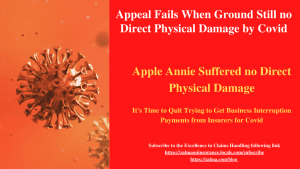Still no Direct Physical Damage by Covid

It’s Time to Quit Trying to Get Business Interruption Payments from Insurers for Covid
The COVID pandemic and ensuing lockdown have generated a host of legal issues. One of the most momentous, in terms of the potential monetary liability, is whether businesses ordered by government decree to close or suspend operations could get compensation under the business income coverage of the standard comprehensive commercial liability policy. The issue has generated opinions from different Courts of Appeal, all of which have held that the issue comes down to whether the insured can allege it suffered “direct physical loss of or damage to [the insured] property.” Having lost in the trial court, the insured here told the court that “this appeal can be viewed as a referendum on whether [those] decisions were correctly decided.” They were right but not as they expected.
In Apple Annie, LLC v. Oregon Mutual Insurance Company, A163300, California Court of Appeals, First District, Second Division (September 2, 2022) the California Court of Appeal refused to be swayed by the Marina Pacific decision.
BACKGROUND
At all relevant times, plaintiff Apple Annie, LLC, operated restaurants in Marin, San Francisco, and Santa Barbara counties. Defendant Oregon Mutual Insurance Company issued Apple Annie a comprehensive commercial liability and property insurance policy that, as relevant here, promised in general to “pay for direct physical loss of or damage to Covered Property at the [insured] premises,” and in particular to “pay for the actual loss of Business Income you sustain due to the necessary suspension of your ‘operations’ during the ‘period of restoration. The suspension must be caused by direct physical loss of or damage to property at the described premises. The loss or damage must be caused by or result from a Covered Cause of Loss.”
According to Apple Annie’s complaint, in March 2020, first the Marin and San Francisco Departments of Public Health, and then the Governor, issued “Shelter in Place orders,” which Apple Annie alleged “caused [it] to suspend business operations at all its locations, which resulted in an immediate loss of business income.” Oregon Mutual denied Apple Annie’s claim for its “business income loss.”
DISCUSSION
After a comprehensive survey of the subject, the court concluded that a business that closed pursuant to a government shut-down order had not suffered “direct physical . . . damage to” the business’s property. This was a matter of plain English:
“The words in the phrase ‘direct physical damage’ all have commonly understood meanings. ‘Physical’ is defined as ‘having material existence: perceptible especially through the senses and subject to the laws of nature.’ [Citation.] ‘Direct’ is defined as ‘proceeding from one point to another in time or space without deviation or interruption,’ ‘stemming immediately from a source,’ and ‘characterized by close logical, causal, or consequential relationship.’
The presence of COVID-19 on Plaintiff’s property did not cause damage to the property necessitating rehabilitation or restoration efforts similar to those required to abate asbestos or remove poisonous fumes which permeate property. Instead, all that is required for Plaintiff to return to full working order is for the [government orders and restrictions to be lifted.
This case . . . concerns an invisible virus that is present throughout the world. . . . It is that general presence, and not a specific physical harm to covered properties, that has caused governments at all levels to consider restrictions. The question, therefore, is one of ‘widespread economic loss due to restrictions on human activities, not the consequence of a direct physical loss or damage to the insured premises. (Inns-by-the-Sea)
Apple Annie contends that “because the phrase ‘physical loss of or damage to’ is phrased disjunctively, ‘loss of’ and ‘damage to’ must each be given a separate meaning.” Apple Annie reasoned: “Because of this disjunctive framing, each concept must be accorded a separate, distinct meaning. An interpretation of ‘loss of’ that assigns it the same meaning as ‘damage to’ would do violence to the language of the policy by rendering the former term surplusage.”
By contrast, the losses here arose from closures intended to limit the spread of a virus that can carry great risk to people but no risk at all to a physical structure.
The Court of Appeal decided to follow the reasoning of Inns-by-the-Sea and similar cases in acknowledging ‘the generally recognized principle in the context of first party property insurance that mere loss of use of physical property to generate business income, without any other physical impact on the property, does not give rise to coverage for direct physical loss. As the United States District Court, Southern District of California stated, that if, for example, a sick person walked into one of Plaintiffs’ restaurants and left behind COVID-19 particulates on a countertop, it would strain credulity to say that the countertop was damaged or physically altered as a result. The majority of cases in California (and elsewhere) are in accord.
Most recently, on July 13, Division Seven of the Second District filed its opinion in Marina Pacific Hotel & Suites, LLC v. Fireman’s Fund Ins. Co. (2022) 81 Cal.App.5th 96 (Marina Pacific). The Court of Appeal went on to hold for the plaintiff insured, on the basis it had pled the element missing from the three earlier cases: it “adequately alleged direct physical loss or damage.” Thus, the court held, Marina Pacific stated a claim for breach of the insurance policy (Marina Pacific, supra, at p. 108), and concluded: “Because the insureds adequately alleged losses covered by Fireman’s Fund’s policy, they are entitled to an opportunity to present their case, at trial or in opposition to a motion for summary judgment. The judgment of dismissal based on the trial court’s disbelief of those allegations, whether ultimately reasonable or not, must be reversed.”
In sum, and in light of the foregoing, we cannot agree with Apple Annie’s primary contention that the policy language-“direct physical loss or damage to,” including its disjunctive phrasing-is ambiguous and “subject to a reasonable construction that supports coverage.” Doing so, the Court of Appeal rejected what may be the two most consequential aspects of Apple Annie’s position:
that “no physical alteration is necessary to show that the policyholder has suffered a ‘physical loss of’ insured property if the governmental authorities issue orders that prohibit the policyholder from using the insured property for its intended purpose,” and
that” ‘physical loss of’ includes the loss of use of the insured property, even if that loss is temporary.” (See Santo’s Italian Cafe LLC v. Acuity Ins. Co., supra, 15 F.4th 398, 402 [“A loss of use simply is not the same as a physical loss”].)
Although the COVID virus has a physical presence, and thus Apple Annie may have suffered economic loss from the physical presence of the COVID virus, it has not suffered direct physical loss of or damage to [its] property.
Apple Annie makes a new argument using a definition in the liability portion of the policy. A similar argument was made, and rejected, in United Talent Agency, which observed that cases involving comprehensive liability coverage are of limited benefit in determining the scope of property insurance coverage.
While Marina Pacific held for the insured, based on its pleading, in its supplemental brief Apple Annie acknowledges that the case does not directly implicate Apple Annie’s theory of coverage.
At oral argument the Court of Appeal asked counsel for Apple Annie – able counsel with significant experience in insurance coverage issues-what Apple Annie would, or could allege. Given that, the fact that this case has been pending for 25 months, and the further fact that Marina Pacific has been extant for over a month, the court concluded that Apple Annie has not met the burden required of it to obtain leave to amend, and we thus deny the belated request.
As I said when I digested the Marina Pacific case, the decision was limited to whether the plaintiff had alleged a cause of action and since they alleged that there was direct physical damage they were entitled to try to prove it. Since this case was not brought on a demurrer’s finding the lack of direct physical damage defeated the claim for business interruption like all of the other cases across the country.

(c) 2022 Barry Zalma & ClaimSchool, Inc.
Barry Zalma, Esq., CFE, now limits his practice to service as an insurance consultant specializing in insurance coverage, insurance claims handling, insurance bad faith and insurance fraud almost equally for insurers and policyholders. He practiced law in California for more than 44 years as an insurance coverage and claims handling lawyer and more than 54 years in the insurance business. He is available at and zalma@zalma.com.
Subscribe and receive videos limited to subscribers of Excellence in Claims Handling at locals.com https://zalmaoninsurance.locals.com/subscribe.
Subscribe to Excellence in Claims Handling at https://barryzalma.substack.com/welcome.
Write to Mr. Zalma at zalma@zalma.com; http://www.zalma.com; http://zalma.com/blog; daily articles are published at https://zalma.substack.com. Go to the podcast Zalma On Insurance at https://anchor.fm/barry-zalma; Follow Mr. Zalma on Twitter at https://twitter.com/bzalma; Go to Barry Zalma videos at Rumble.com at https://rumble.com/c/c-262921; Go to Barry Zalma on YouTube- https://www.youtube.com/channel/UCysiZklEtxZsSF9DfC0Expg; Go to the Insurance Claims Library – https://zalma.com/blog/insurance-claims-library/
Like this:
Loading…
Related






